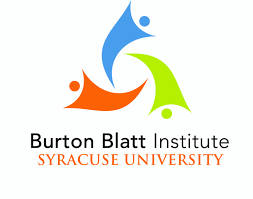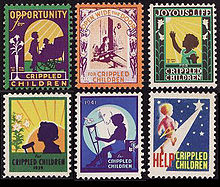
The Americans with Disabilities Act of 1990 or ADA is a civil rights law that prohibits discrimination based on disability. It affords similar protections against discrimination to Americans with disabilities as the Civil Rights Act of 1964, which made discrimination based on race, religion, sex, national origin, and other characteristics illegal, and later sexual orientation and gender identity. In addition, unlike the Civil Rights Act, the ADA also requires covered employers to provide reasonable accommodations to employees with disabilities, and imposes accessibility requirements on public accommodations.

An assistance dog, known as a service dog in the United States, is a dog trained to aid or assist an individual with a disability. Many assistance dogs receive training from a handler or from an assistance dog organization.
The disability rights movement is a global social movement that seeks to secure equal opportunities and equal rights for all people with disabilities.
The American Dental Association (ADA) is an American professional association established in 1859 which has more than 161,000 members. Based in the American Dental Association Building in the Near North Side of Chicago, the ADA is the world's largest and oldest national dental association. The organization lobbies on behalf of the American dental profession and provides dental accreditation.
Ontario March of Dimes is a charitable organization which provides programs and services to people of all ages with physical disabilities in Ontario, Canada. Its headquarters is in Toronto. It is not affiliated with the American organization called March of Dimes.

The CNIB Foundation is a Canadian charitable organization and volunteer agency dedicated to assisting Canadians who are blind or living with vision loss, and to provide information about vision health for all Canadians. Founded in 1918 as the Canadian National Institute for the Blind to assist soldiers who had been blinded in the First World War, CNIB originally offered sheltered care and specialized employment to people with vision loss. It has since expanded to include other programs and services, including research, public education, rehabilitation counselling and training, advocacy and an alternative-format library for people living with a print disability. It is a member of the Braille Authority of North America.
In Canada, Easter Seals is a group of charitable organizations which supports the development and advancement of people who are living with different types of disabilities. Founded in 1922 by a group of Rotary Clubs, it sought to emulate the success of the American Easter Seals program.

The Burton Blatt Institute (BBI), established at Syracuse University in 2005, is an organization that aims to advance civic, economic, and social participation of persons with disabilities in a global society. Peter Blanck, a University Professor at Syracuse University, is the chairman of BBI.

March of Dimes Canada (MODC), officially the Rehabilitation Foundation for Disabled Persons, Canada is a registered national charity established in 2005 by Ontario March of Dimes. MODC aims to provide community-based rehabilitation services and resources across the country to people with physical disabilities.

United Cerebral Palsy (UCP) is an international nonprofit charitable organization consisting of a network of affiliates. UCP is a leading service provider and advocate for adults and children with disabilities. As one of the largest health nonprofits in the United States, the UCP mission is to advance the independence, productivity and full citizenship of people with disabilities through an affiliate network.

Crotched Mountain Rehabilitation Center is located in Greenfield, New Hampshire, United States. It began as a rehabilitation center for children with polio. However, over the years it has evolved into one of New Hampshire's largest human services organizations, serving students with disabilities at Crotched Mountain School, children with autism through its "Ready Set Connect" programs, and adults with unique needs through Crotched Mountain Community Care.
The Autistic Self Advocacy Network (ASAN) is an American 501(c)(3) nonprofit advocacy organization run by and for individuals on the autism spectrum. ASAN advocates for the inclusion of autistic people in decisions that affect them, including: legislation, depiction in the media, and disability services.
Kessler Foundation, established in 1985, is a leading nonprofit in the field of rehabilitation research for people with disabilities. Kessler Foundation has its roots in the Kessler Institute, founded in 1949 to improve medical outcomes and employment of people disabled by brain or spinal injury. Kessler Foundation conducts rehabilitation research with the goal of increasing function for cognition, mobility, and long-term outcomes, including employment, for people with neurological disabilities caused by diseases and injuries of the brain and spinal cord.

Ari Daniel Ne'eman is an American disability rights activist and researcher who co-founded the Autistic Self Advocacy Network in 2006. On December 16, 2009, President Barack Obama announced that Ne'eman would be appointed to the National Council on Disability. After an anonymous hold was lifted, Ne'eman was unanimously confirmed by the United States Senate to serve on the Council on June 22, 2010. He chaired the council's Policy & Program Evaluation Committee making him the first autistic person to serve on the council. In 2015, Ne'eman left the National Council on Disability at the end of his second term. He currently serves as a consultant to the American Civil Liberties Union. As of 2019, he also is a Ph.D. candidate in Health Policy at Harvard University.
SourceAmerica is a U.S. nonprofit agency, located in Vienna, Virginia, that creates employment opportunities for people with disabilities through its national network of affiliated nonprofit agencies.

Disability in Yemen has been increasing over time, especially because of increased conflict in the area. Disabled people in Yemen face many challenges due to poverty, lack of accessible infrastructure, gender segregation and more. The government of Yemen has passed laws to help protect the rights of disabled people in their country, but not all laws are equally enforced.
Evelyne Jobe Villines was an American disability rights advocate and political activist who had Poliomyelitis. Villines worked for both the state of Iowa and the federal government as an advocate. The Des Moines Register called her a "nationally known spokeswoman for the disabled" in 1992.

YAI, previously known as the Young Adult Institute, is an organization serving people with Intellectual and developmental disabilities (IDD) in the United States. YAI launched as a pilot program at a small school in Brooklyn, New York, in February 1957. The pilot program was run by co-founders Bert MacLeech and Pearl Maze and served seven people with I/DD. Today, YAI has expanded to a team of over 4,000 employees and supports over 20,000 people in the I/DD community. YAI supports people with Autism, Down syndrome, and Cerebral palsy, among others.
Howard Center is a Burlington, Vermont-based nonprofit organization that offers professional crisis and counseling services to children and adults; supportive services to individuals with autism and developmental disabilities who need help with education, employment, and life maintenance skills; counseling and medical services for those struggling with substance use disorders; and interventions and supports for adults with serious and persistent mental health challenges in Chittenden County, Vermont's most populous county. Howard Center collaborates with many community partners and is a United Way of Northwest Vermont-funded agency.











